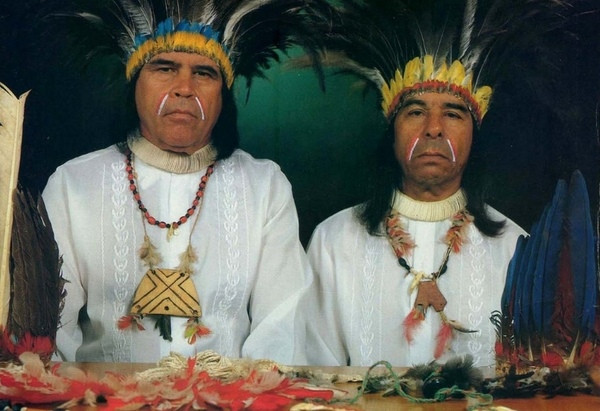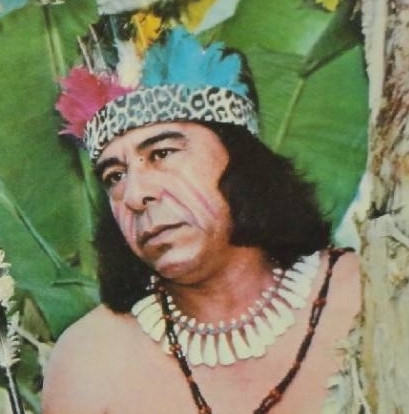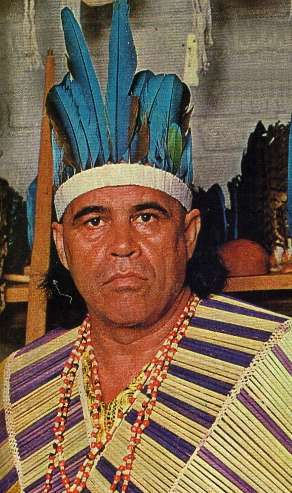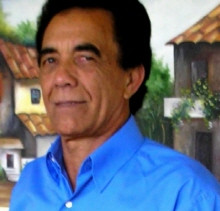
Cacique E Pajé
Band, BR
Folk, Latin and World
A.k.a. Antônio Borges de Alvarenga (Cacique), Roque Pereira Paiva (Pajé) and Geraldo Aparecido da Silva (second Pajé) Rei Do Gado E Boiadeiro
The Brazilian musical duo Kayapo Indians "Cacique E Pajé" had two members in the original line-up: Antonio Borges de Alvarenga and Roque Pereira Paiva. Antonio Borges de Alvarenga, the "Cacique (3)" the son of Francisco Borges de Alvarenga and Joana Geraldina de Oliveira, was born into a tribe on the banks of "Vermelho River" in the village of "Rondonópolis-MT", on March 25, 1935. Roque Pereira Paiva, the first "Pajé" the son of Antonio Pereira Paiva and Cecilia Verdoot, was born in the same tribe on August 22, 1936 and died in São Paulo-SP on March 5, 1994. Geraldo Aparecido da Silva, the second "Pajé (2)" son of india Joana Dias Barbosa was born in Itapuí-SP, on the banks of the "Tietê River", on 29 July 1943. Joan's husband was cowboy and also catireiro and very good guitarist, according to Geraldo, who became the Pajé from the year 1997. Antonio and Roque develop artistic activities and use several other pseudonyms before forming the double "Cacique E Pajé": Antonio initially adopted the stage name of "Peixoto" and made João Rodrigues, the duo "Peixoto E Peixinho." They recorded in Centenário recording a double compact in which contained the song "Violeiro Franco" (written by Antonio Borges and Roque Pereira Paiva). Then adopted the name of "Rei Do Gado" and teamed with Mulatinho: the double "Pião Campeiro E Rei Do Gado", which released an LP in 1970 by the California label , highlighting among others the song "Arrependida" (written by Garcia and João Matão). In 1971, Antonio Borges recorded with João Antonio an LP by Fermata. and made double with João Ferreira (5): "João Ferreira E Rei Do Gado" A short time later, he changed his stage name to "Ferreirinho" becoming the double "João Ferreira E Ferreirinho". Roque, in 1971, released an LP with "Pião De Ouro", variation Peão De Ouro, forming the duo "Pião De Ouro E Boiadeiro". In 1977, Antonio resumed the stage name of "Rei Do Gado" finally joined up to Roque, who had adopted the name of "Boiadeiro". And, under the pseudonym "Índios Caiapó", recorded an LP for Sonora. It was the double "Rei Do Gado E Boiadeiro" - "The Kayapo Indians". It was in 1978, who was born the duo called "Cacique E Pajé, at which time they recorded an LP by Chantecler, highlighting "Pescador E Catireiro" (written by Cacique and Carreirinho). In the same year, participated along with Sérgio Reis and Orchestra Violeiros of Osasco-SP history show promoted by Tonico & Tinoco at the Teatro Municipal de São Paulo-SP, which also gave rise to the book "Da Beira da Tuia ao Teatro Municipal". In fact, it was Tonico and Tinoco who, having enjoyed double, suggested the name. Cacique learned that he was actually the son of the chief of the Kayapo tribe, while his paternal grandfather was a shaman (medicine man) in the same tribe. In 1979, they have made it with "Caçando E Pescando" (written by Cacique and Tangará) and "Deixe O Índio Em Paz" (written by Cacique and Captain Furtado). And in the 1980's, launched over five LPs, highlighting, among others, "Viola No Samba" (writte'n by Rei Do Mar and Cacique), "Poemas Das Cordas" (written by Paulo Gaúcho and Zé Raimundo), " Cadê O Gato "(written by Cacique and Pajé) and "As Flores e os Animais" (written by Paraíso and José Fortuna). In 1983, Cacique E Pajé participated LP of Taiguara "Canções De Amor E Liberdade" playing with it "Voz Do Leste" (Taiguara). Drive this, by the way, extremely exciting, that was the first to Taiguara recorded after returning from exile in Uruguay. In 1985, when launching the 8th LP, highlighting "Peão Sabido" (written by Cacique and Nhô Véio), Pajé was the victim of a stroke which forced him to move away from the pair. There followed a period of three years in which the performances continued, however, Pajé only "dubs" and could barely greet the public. Cacique was also helped by the duo's Rock "Rocha E Umuarama," by João Matão and also by Odilon (the same that has graduated with double Tião Do Carro), the presentations in which the Pajé was not able to perform. In 1993, Cacique also fell ill with heart problems and required surgery. There followed a period of extreme hardship, in which both members of the duo were aided by blood brothers, who formed the duo "Caiapó E Cauê" who came to "interpret" Cacique and Pajé, since Cacique reached almost lose the voice. In addition to "Caiapó E Cauê" Odilon and Zé Matão also "dublavam" Cacique and Pajé in the presentations of the pair. And in that period, several "Pajés" also sang alongside Cacique among them Luiz Mariano, Zé Nobre and Pedrinho Tamim until Roque Pereira Paiva, the "Pajezinho", as it is affectionately called by Cacique came the tragically died at the 1994, after losing his voice, suffered two strokes, and has had arm and leg amputees rights. "Pajezinho" left his wife with eight children. Cacique, disillusioned, had medical information that no longer would return to sing. On that occasion, Cachoêra (José Pereira de Souza), who was a studio musician, also gave a strength and sang some time in place of the Pajé, having also recorded two discs. Cachoêra replaced Pajé the double, which continued with the same name and launched new LP by the Gold Record label, highlighting "Barretos Não Faz Feio" (Cacique, Lourival dos Santos and João Macedo). According to Cacique, the Pajezinho is that arranged the 'Pajé' him. He listened and indicated. But after he died, he got the Cachoêra. The current "pajé" he already knew, he's kind of his cousin. Geraldo, the second Pajé (2), had already made double with João Goiano and also integrated the "Trio Andorinha". It was a presentation of this trio was born the new double Cacique E Pajé, as we know it today. After Geraldo Aparecido have sung along with Antonio Borges, several bystanders embraced them and said it was "... the best double after the first Pajé ..." Among those present were Pedro Jacob and also the Aleixinho composer. Antonio Borges and Geraldo Aparecido, the new double "Cacique E Pajé" then recorded a CD containing only Fashions of Viola. And more were 6 CD's and several concerts that followed. Antonio Borges and Geraldo Aparecido remains in full swing with the name Cacique E Pajé.
Discography
| Title | Artist | Year | Type |
|---|---|---|---|
| 80 Anos De Música Sertaneja | Cacique E Pajé | 2008 | Compil. |
| 2 LPS Dose Dupla | Cacique E Pajé | 1996 | Compil. |
| Cacique E Pajé | Cacique E Pajé | 1983 | Album |
| Poema Das Cordas - Vol. 3 | Cacique E Pajé | 1980 | Album |
| Cacique E Pajé (Vol. 1) | Cacique E Pajé | 1978 | Album |
| Som Da Terra | Cacique E Pajé | Compil. |



